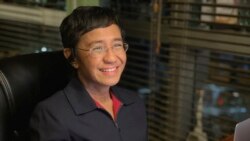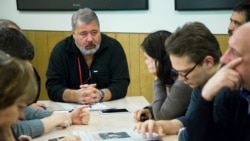Journalists Maria Ressa of the Philippines and Dmitry Muratov of Russia won the 2021 Nobel Peace Prize Friday for their fight for freedom of expression in countries where media outlets have faced persistent attacks and reporters have been murdered.
In making the award, the Norwegian Nobel Committee stressed that an independent press is vital in promoting peace.
"Free, independent and fact-based journalism serves to protect against abuse of power, lies and war propaganda," said Berit Reiss-Andersen, chair of the committee, explaining why the prize was awarded to two journalists.
"Without freedom of expression and freedom of the press, it will be difficult to successfully promote fraternity between nations, disarmament and a better world order to succeed in our time," she said.
The Nobel committee noted that Ressa in 2012 co-founded Rappler, a news website that has focused critical attention on President Rodrigo Duterte "controversial, murderous anti-drug campaign" in the Philippines.
She and Rappler "have also documented how social media is being used to spread fake news, harass opponents and manipulate public discourse."
Reacting to the news, Ressa told Norway's TV2 channel that "the government will obviously not be happy."
"I'm a little shocked. It's really emotional," she added. "But I am happy on behalf of my team and would like to thank the Nobel Committee for recognizing what we are going through."
The award-winning journalist was convicted last year of libel and sentenced to jail in a decision seen as a major blow to press global freedom. She was the first woman awarded a Nobel this year.
Muratov was one of the founders in 1993 of the independent Russian newspaper Novaya Gazeta, which the Nobel committee described as "the most independent newspaper in Russia today, with a fundamentally critical attitude towards power."
"The newspaper's fact-based journalism and professional integrity have made it an important source of information on censurable aspects of Russian society rarely mentioned by other media," it added.
Muratov said he would use his win to help independent journalists who have faced a growing pressure from the authorities, including those who were officially declared "foreign agents" — a designation that carries pejorative connotations and implies additional government scrutiny.
"We will use it to shore up Russian journalism that has faced repressions," he said in comments carried by a Russian messaging app channel. "We will try to help the people who have been designated as agents, have faced persecution and have been forced out of the country."
According to the Committee to Protect Journalists, 17 media workers were killed in the Philippines in the last decade and 23 in Russia.
Former Soviet leader Mikhail Gorbachev used some of his prize money from winning the Nobel in 1990 to help what would become Novaya Gazeta buy office equipment and computers.
The Nobel committee noted that since the launch of the newspaper, six of its journalists have been killed, among them Anna Politkovskaya, who covered Russia's bloody conflict in Chechnya.
Kremlin spokesman Dmitry Peskov praised Muratov as a "talented and brave" person.
"We can congratulate Dmitry Muratov — he has consistently worked in accordance with his ideals," Peskov said in a conference call with reporters.
Some critics questioned if the award respected Swedish inventor Alfred Nobel's will and its original purpose to prevent war. Dan Smith, director of the Stockholm International Peace Research Institute, was among those who said it was justified.
"Freedom of expression is a part of democracy, and democratic systems are proven to be more stable, less likely to go to war with each other, less likely to experience civil war," Smith told The Associated Press.
"I think the important thing about a media that's truly free is that it not only acts independently, but it respects the truth. And that seems to me to be also an important part not just of democracy, but also of the work towards peace."
Reiss-Andersen noted that the peace prize has gone to journalists before, including Ernesto Teodoro Moneta of Italy, cited in 1907 "for his work in the press and in peace meetings."
In 1935, German journalist Carl von Ossietzky was awarded the prize "for his burning love for freedom of thought and expression" after revealing that the Nazi regime was secretly re-arming in breach of the World War I peace accord.
Ressa has been particularly critical also of the role of tech companies such as Facebook in manipulating public debate, and their failure to curb hate speech.
Speaking on Rappler's site after the award was announced, Ressa said the "virus of lies that has been introduced through the algorithms of the social media platforms, it infects real people and changes."
Reiss-Andersen also noted the risks to free speech in today's world due to the spread of fake news.
"Conveying fake news and information that is propaganda and untrue is also a violation of freedom of expression, and all freedom of expression has its limitations. That is also a very important factor in this debate," she said.
Media rights group Reporters Without Borders celebrated the announcement, expressing "Joy and urgency" in reaction to the news.
"Joy because this is an extraordinary tribute to journalism, an excellent tribute to all journalists who take risks everywhere around the world to defend the right to information," the group's director Christophe Deloire said from its Paris headquarters.
The group, known by its French acronym RSF, has worked with Ressa and Muratov to defend journalism in their countries, and comes under regular criticism from authoritarian governments.
"And also urgency because it will be a decisive decade for journalism. Journalism is in danger, journalism is weakened, journalism is threatened," Deloire said. "Democracies are weakened by disinformation, by rumors, by hate speech."
"This prize is a great signal, a very powerful message to defend journalism everywhere."
After the announcement, the Nobel committee itself was put on the spot by a reporter who asked about its decision to award the 2019 peace prize to Ethiopian Prime Minister Abiy Ahmed, who has since become entangled in a domestic conflict with the powerful Tigray region.
"Today, I will not comment on other Nobel laureates and other issues than we have on the table today, but I can mention that the situation for freedom of press in Ethiopia is very far from ideal and is facing severe restrictions," Reiss-Andersen said.
The award is accompanied by a gold medal and more than $1.14 million (10 million Swedish kronor). The prize money comes from a bequest from Nobel, who died in 1895.






